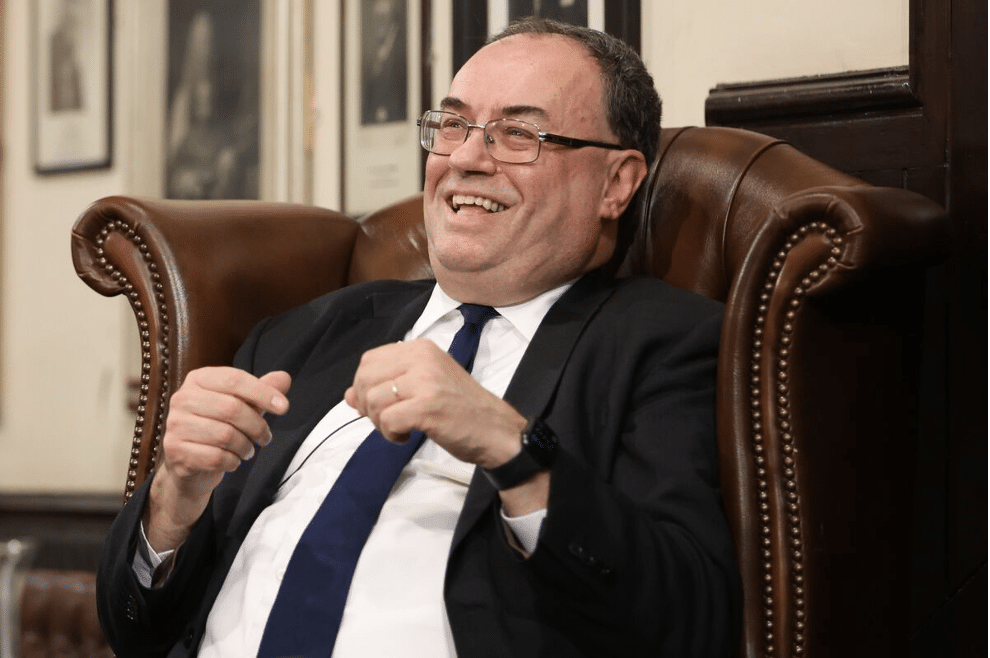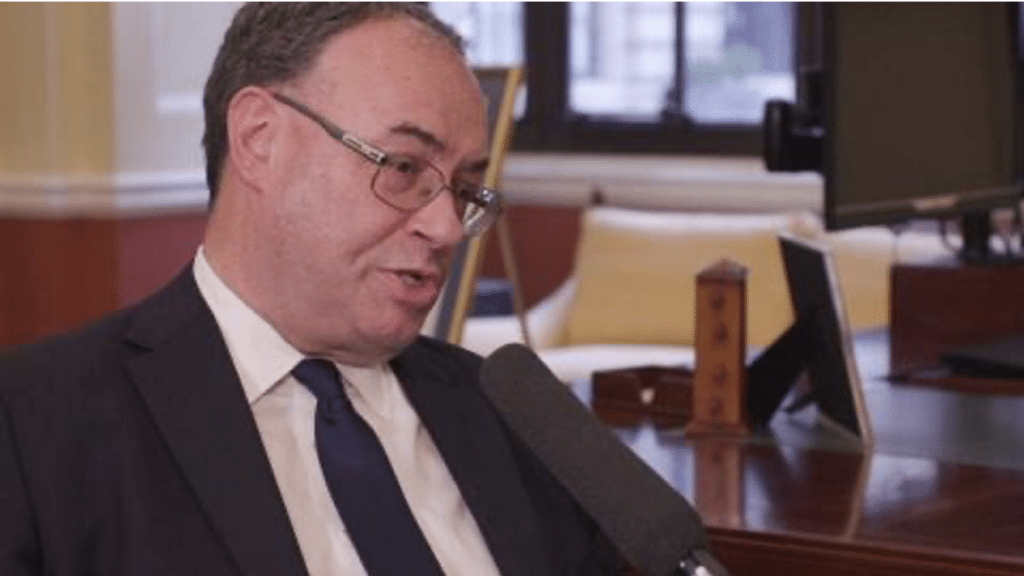Andrew Bailey has begged workers not to ask for pay rises and companies not to increase prices. He’s living in a dream world.

In 550 BC, Lydian King Croesus’s brother-in-law, the Median King Astyages, was overthrown by his grandson Cyrus the Great. Enraged, Croesus consulted the Oracle of Delphi who told him that he would ‘destroy a great empire.’
Accordingly, he went to war against Cyrus and was subsequently militarily crushed.
I have concluded that the Bank of England has similarly accurate prophetic powers.

Incidentally, Delphi is a wonderful place to visit — here I am at the tender age of 19 after cycling there from the UK.
Back to our illustrious central bank.
After the Global Financial Crisis in 2008, the Bank of England reduced the base rate below 1% and kept these emergency rates for well over a decade. Simultaneously, starting in March 2009 it decided that because the base rate couldn’t be allowed to go below 1% (for obvious reasons), it was going to stimulate the economy by buying £895 billion of bonds.
Predominantly government bonds, this quantitative easing combined with low rates to create a hugely toxic asset bubble — particularly in housing — that is either going to decimate growth as the next generation finds buying homes impossible or will pop with economically catastrophic consequences.
Andrew Bailey’s mistakes
Bailey has not apologised for any previous bank mistakes. Despite hailing inflation as ‘transitory’ for almost a year, the base rate only rose from 0.1% to 0.15% in December 2021 — at the time CPI inflation had already been allowed to rise to 5.4% and getting in front had become impossible.
The Bank started selling off its bonds since November 2022, while also raising rates. This is unlikely to not end in tears. But Bailey still wants to ‘push back strongly against one argument you sometimes hear, which is that inflation is high because monetary policy was too loose in the past.’
His assertion is that ‘even if we had had the benefit of full hindsight in the run-up to the war in Ukraine, and ample advanced warning – which for the record we did not, no one did – then in order to keep inflation at around 2%, we would have had to raise Bank Rate well into double digits, sending unemployment much higher than it is today.’
But while Bailey only took the reins at the Bank in December 2019, he was previously in charge of the FCA from July 2016. Perhaps during the pandemic or immediately after the Ukraine War there was an excuse not to lift rates, but in the many years before, it could have been done with relatively little economic damage.
And when the next disaster came around, it would have been in a much stronger position. The problem now is that most inflation is supply-side, so the Bank is now raising rates to subdue demand when in reality what’s needed is unpopular fiscal policy on the government side to deal with reduced economic supply.
It’s akin to using a sledgehammer to change a car tyre. For context, private sector wages are now rising at a rate of 7%. On 4 February 2022, the Governor thought that increasing rates to 0.5% would be enough to stop higher prices becoming ‘ingrained,’ and further, when questioned whether workers should stop asking for pay rises, said ‘broadly yes,’ even it if would be ‘painful’ to do so as some ‘moderation of wage rises’ was needed.

Just over a year late on 24 March 2023, the Governor told BBC Today that ‘if all prices try to beat inflation, we will get higher inflation’ which ‘hurts people’ and asked companies to limit price increases.
Asking employees not to ask for pay rises and companies to limit prices is not capitalism. And without any kind of stick or carrot, it’s meaningless platitudes at best.
Of course, it’s not just Bailey with terrible forecasting prowess. Yes, he expected a two-year-long painful recession only a few months ago, and now thinks the UK will avoid a recession altogether. Similarly, he felt that inflation would hit circa 3% by year-end, and now that prediction is 5%.
And over the past few weeks, he has both intoned that there is and is not a wage-price spiral.
But the Office for Budget Responsibility thought that inflation would be down to 2.9% by the end of 2023. This is now clearly laughable. And the International Monetary Fund believed in April that the UK’s GDP would decline by 0.3% and enter recession this year — two months later, it expects 0.4% growth.
The OECD’s prediction that the UK will see 0% growth this year will probably be the next forecast to be jettisoned. It’s worth noting that a year ago, most economists didn’t even think an increase to 3% base rate was likely — this speaks volumes of the apathy until now.
April CPI Inflation
CPI inflation fell from 10.1% in March to 8.7% in April — but this was much hotter than the Reuters analyst poll expectation for 8.2%. Ironically, widespread groupthink means that this poll has been out by a wide margin many times since 2021.
Core CPI inflation — which strips out volatile aspects like food — rose from 6.2% to 6.8%. This suggests that inflation is firmly embedded — and once you are above 8% inflation, a combination of rising wages and sticky supply/demand issues will keep you there longer.
It’s worth noting that inflation rose from 7% to 9% between March and April 2022, so there was already a fall baked into expectations. Between April and May 2022, the rise was from 9% to 9.1%, so it’s unlikely that the UK will see another sustained fall next month — and indeed, an increase is more than possible.
Electricity and gas fell by 1.4% — as ever, energy is the primary mover of inflation. Food dipped very slightly to 19.1%, but it’s important to realise that this is very close to the EU average, and we are rising from a much lower base. Food in this country is still relatively cheap.
Markets are now pricing in an increase in the base rate to 5.5% — up from expectations a few days ago that the current 4.5% would terminate in the 4.75% to 5.00% range. Remember, most economists thought that 3% rates were highly unlikely by this point at this time last year.

And now Barclays CEO CS Venkatakrishnan — or Venkat as he’s affectionately known — has warned that the sharp interest rate rises will lead to a ‘huge income shock’ for mortgage holders by the end of 2024 as fixed rate deals expire.
I’ve been banging the house price fall and mortgage shock drum set for some time. It’s nice to see more and more people start to agree.
Bailey has conceded to the Treasury Select Committee that the Bank has a ‘very big lesson’ to learn about forecasting, while chief economist Huw Pill also acknowledged that his inflation estimates were ‘too low,’ weeks after arguing that Brits simply ‘need to accept’ that they are poorer.
The Bank still thinks inflation will fall sharply with falling energy bills — though cannot rule out another shock next winter. And with Bailey and Pill seemingly happier to beg employers and employees to stop asking for more money out of a sense of charity, it’s hard to take their latest predictions with even a degree of sincerity.
Instead, I’ll consult the Oracle.
This article has been prepared for information purposes only by Charles Archer. It does not constitute advice, and no party accepts any liability for either accuracy or for investing decisions made using the information provided.
Further, it is not intended for distribution to, or use by, any person in any country or jurisdiction where such distribution or use would be contrary to local law or regulation.
